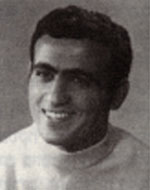Yehuda, son of Tova and Sasson, was born on 14.11.1947 in Elroy, near Kiryat Tivon, where he studied at the Kiryat Amal School in Kiryat Tivon and at the Beit HaKakid High School in Haifa. One of the first settlers in Moshav Elroi, his father joined the Jewish Settlements Police and was the commander of a unit of guardians in the moshav, and Yehuda was educated to the love of the people and the homeland and was a member of a religiously observant family. He was a Gadna counselor in the moshav and in the HaNoar Haoved youth club and later called the young members of these clubs, devoted most of his time to their education and traveled extensively with them on trips and trips around the country. “Haifa (youth). He did a lot of swimming, excelled in this profession and took a special diving course. He was naturally a very sociable young man, loved and admired by his many friends. Whatever Judah did in his civilian life and during his years in the army, or in sports, instruction and studies, he did so with dedication and dedication. Yehuda was drafted into the IDF in mid-November 1965 and served in the Engineering Corps in his regular service, and later in the career army, where he took a platoon commander’s course, a platoon and a plasim course. Before the end of his regular service, his commanders recommended sending him to an officer’s course, and he completed the course with great success. During his vacations Judah made great progress with his family, and out of his stories at home, his great concern for his soldiers and his devotion to his duties stood out. Yehuda quickly climbed up the ranks and commanded the engineering corps and reached the rank of captain. He excelled in his leadership and professional and technical knowledge. His commanders and friends testify to him that the leadership and the command were embedded in his blood, and as a result he acquired the esteem of his superiors and the admiration of his subordinates. He was a personal example and often preached to the commanders to serve as a personal example for their soldiers. In the career army, Yehuda became part of the Engineering Corps’ success, and soon became one of the best experts in this field. He has often initiated technical and operational solutions in the theory of success and the development of means of success. In an action that took place in the summer of 1970, on the eve of the cease-fire in the Suez Canal, Yehuda was outstanding for his leadership and knowledge, and under his command and control, the engineering corps transferred a large number of fighters to the West Bank of the Canal near Kantara. After this action, one of the commanders said: “Yehuda Hudda belongs to the same type of officers, on whom you can always rely.” During the Yom Kippur War, Yehuda commanded the means of success that were brought to the Suez Canal to cross it, in the area of action of the Major General Sharon Division. Yehuda was the deputy battalion commander and was given the heavy responsibility for the construction of the bridges in the area of the success, at the top of the bridge, north of the Great Bitter Lake. Yehuda was responsible for transporting the barges and bridges in difficult battle conditions, and on an overloaded route in vehicles, people and equipment that flowed to the yard, the area chosen for crossing the canal. He himself did much in establishing the first bridge on the canal, and his great joy was when the construction of this bridge was completed and the forces began to flow into Egypt. Every night Yehuda and his men planned the bridge maintenance method the next day and the methods of protecting it from the fierce artillery fire of the Egyptians, who kept ringing the bridges. One of his fellow officers described these difficult times: “Yehuda was old, dirty in the sand and mud, and he was restlessly moving back and forth on the bridge. Judea did not rest until the cease-fire came into force on October 22. In the hours before the cease-fire, there was silence at the top of the bridge. In the last ten minutes, however, the Egyptians began a heavy bombardment that was unprecedented, and an enormous quantity of mortar shellsA Katyusha was aimed at the bridges. In this heavy shelling, on the 27th of Tishrei 5734 (October 22, 1973), Judah was hit and killed. He was brought to eternal rest in the Haifa cemetery. Survived by his parents and seven brothers and sisters. After his fall, he was promoted to the rank of major and awarded the “Medal of Valor”. And this is the text of the decoration certificate: “The late Rabbi Yehudah Hodda served as battalion commander in the Engineering Battalion who built the bridges to cross the canal. Despite being wounded, he operated and operated the battalion’s forces efficiently under heavy shelling, while he was everywhere, evacuating casualties and organizing the work as the driving force behind the construction of the bridges. In this he showed courage, resourcefulness and leadership in particularly difficult circumstances. In the last moments before the cease-fire, he was hurt and killed. “In a letter of condolences to the bereaved family, Defense Minister Moshe Dayan wrote that Yehuda was” an excellent, energetic and energetic officer, knowledgeable in mediation, efficient, Donated a Torah scroll and a box to the synagogue in Elroy in Kiryat Tivon, one of the three bridges that stretched along the Suez Canal and existed until the departure of IDF forces from the West Bank. In many articles and articles published in Bamahane and in daily newspapers during and after the war, as well as in several books about the war, the story of the life and the fall of the outstanding engineering officer was described, which allowed the IDF to cross the western bank of the canal.
